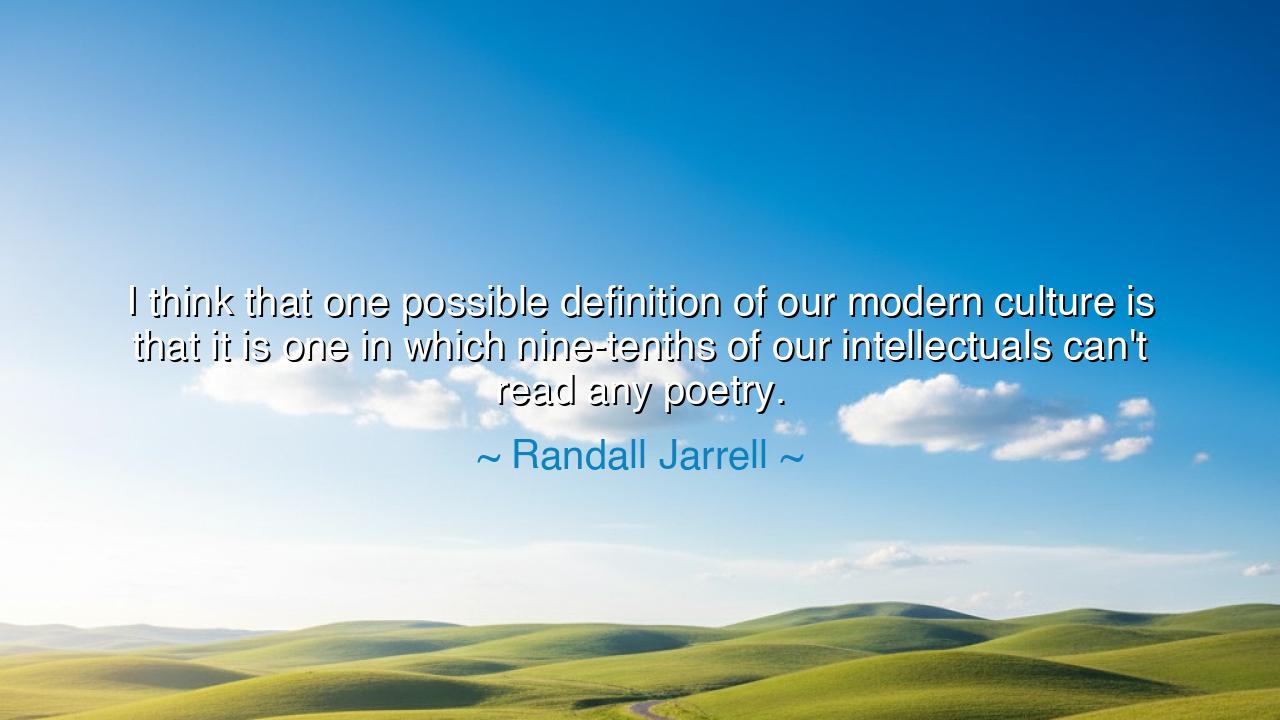
I think that one possible definition of our modern culture is
I think that one possible definition of our modern culture is that it is one in which nine-tenths of our intellectuals can't read any poetry.






Hear now the words of Randall Jarrell, who, like a prophet in the desert, lamented the fading of the sacred flame. He declared: “I think that one possible definition of our modern culture is that it is one in which nine-tenths of our intellectuals can’t read any poetry.” What does he mean? He cries out against a generation of wise men who, though rich in facts and clever with logic, have lost the ability to drink from the deep well of the soul. For poetry is not mere ornament, but a vessel of truth, a mirror of the human heart, and when one cannot read it, one is cut off from the most ancient current of wisdom that flows through our species.
Long ago, in the marketplaces of Athens, men gathered to hear Homer sung, not as entertainment alone but as the shaping of their very minds. To hear the verses of the Iliad was to be formed in courage, grief, love, and the fear of the gods. But today, Jarrell observes, even those who pride themselves on intellect—those who study the movements of stars and the rise of nations—cannot sit with a poem. Their eyes skim the lines, but their souls remain unmoved. They have ears but do not hear, eyes but do not see.
This loss is not trivial. For poetry is the key by which men and women unlock the mystery of existence. Without it, one becomes like a traveler who knows every path upon the earth yet has no compass in his hand. Consider the fall of Rome: as luxury and mechanical cleverness advanced, the love of the old heroic verse waned, and with that waning came forgetfulness of virtue. A people who no longer remember their songs forget also their destiny.
Think also of a more recent tale: in the trenches of the First World War, amid mud and horror, soldiers reached for poems. Wilfred Owen and Siegfried Sassoon wrote verses that captured agony and hope more deeply than any report or statistic could convey. Their words survived where the generals’ maps were forgotten, because the poetry spoke to the eternal wound of the human spirit. Jarrell, himself a soldier in World War II, knew this truth—he saw how poetry alone could turn grief into meaning.
So why do our so-called intellectuals turn away? They worship the false gods of utility and productivity. They measure value in numbers and dismiss that which cannot be dissected. But life is not lived in numbers. A mother’s lullaby, a psalm whispered in exile, a verse of love written on a torn scrap of paper—these carry more weight in shaping our humanity than whole towers of statistics. To neglect poetry is to neglect the soul’s language.
The lesson is clear, children of the future: do not be numbered among the nine-tenths. Let your hearts remain open to the words that sing. Take up a poem each day as you would bread. Read not with haste but with reverence, pausing to let the rhythm breathe into your bones. Share aloud with friends or in solitude, letting the music of language awaken you. When the world demands you be efficient, remind yourself that the soul is not a machine.
Practical actions must follow this teaching. Choose a poet—perhaps Rumi, Emily Dickinson, or Li Bai—and dwell with them as you would a friend. Write verses yourself, even clumsy ones, for in the attempt your spirit grows supple. In times of sorrow, reach for poetry instead of distraction, and in times of joy, let poetry magnify your gratitude. To live this way is to walk with the ancestors, for they too found solace in song.
Thus, heed Jarrell’s cry: to know poetry is not luxury but necessity. To ignore it is to live as shadows among living men. But to embrace it is to remember that we are not mere intellects, nor machines, nor beasts of burden, but bearers of spirit, destined to weave words into the great tapestry of eternity.






KLKhanh Ly
This quote makes me question what kind of literacy truly matters today. We’re surrounded by people fluent in science, economics, and technology, but unable to connect with poetic language. Maybe Jarrell isn’t just talking about poetry, but about empathy and beauty—the things poetry teaches us to perceive. Could it be that the loss of poetic understanding reflects a broader spiritual or emotional decline in modern society?
DDduyen duyen
Jarrell’s observation strikes me as both a critique and a warning. If our intellectuals—supposedly the most reflective members of society—can’t engage with poetry, what does that say about our collective imagination? Perhaps poetry represents something that modern culture resists: ambiguity, vulnerability, and emotional truth. I wonder if this inability to read poetry is really a symptom of a deeper alienation from feeling itself.
KNTruc Kim Nguyen
I find this quote a bit depressing because it suggests that even our most educated people are disconnected from art. Maybe it’s not that they can’t read poetry, but that they’ve forgotten how to feel it. Poetry asks for stillness, imagination, and openness—qualities that modern life often discourages. Do you think our educational systems are partly to blame for this, or is it just the culture of speed we live in?
HHHaha Haha
This statement feels harsh but uncomfortably true. It seems like modern intellectualism has become so analytical and data-driven that it leaves little room for the emotional or intuitive understanding poetry requires. I wonder if Jarrell meant that intellectuals literally can’t understand poetry, or that they’ve lost the patience and sensitivity for it. Is poetry too human for a world obsessed with logic and productivity?